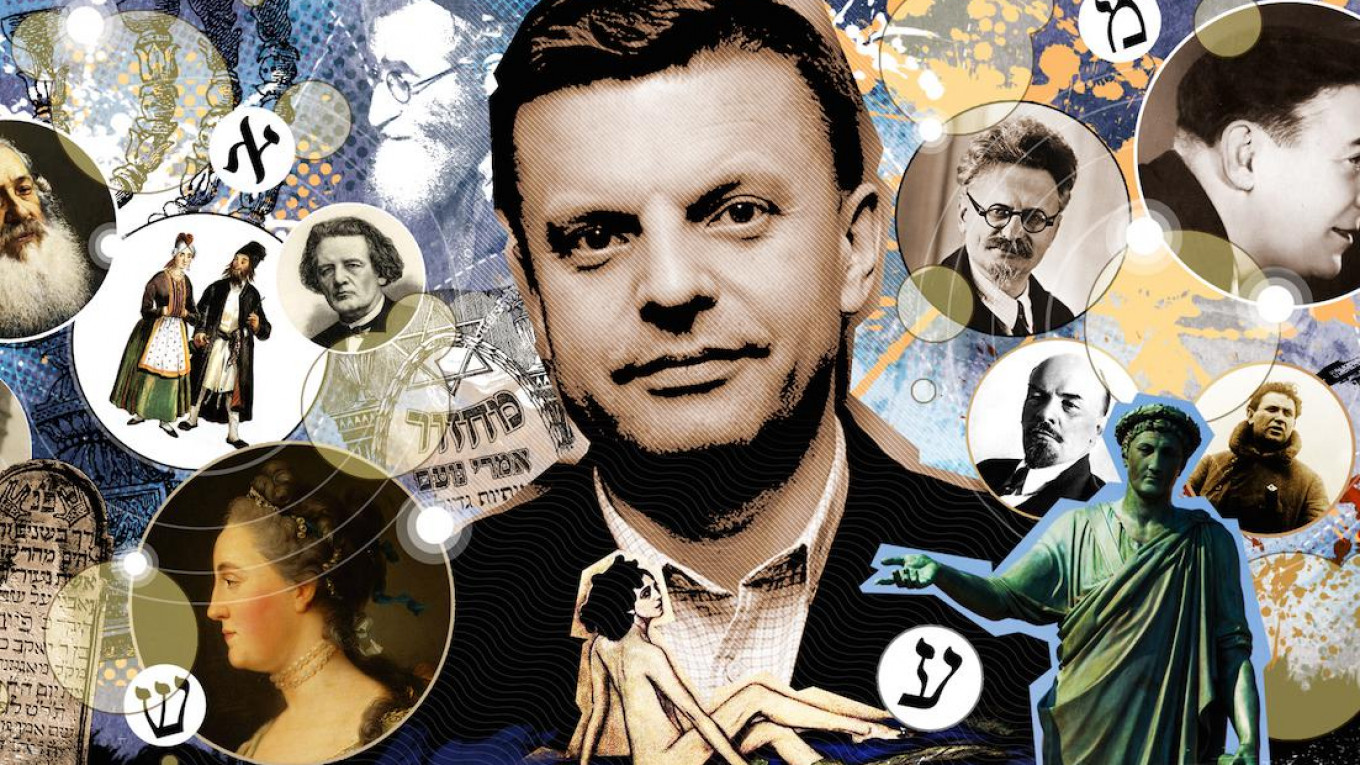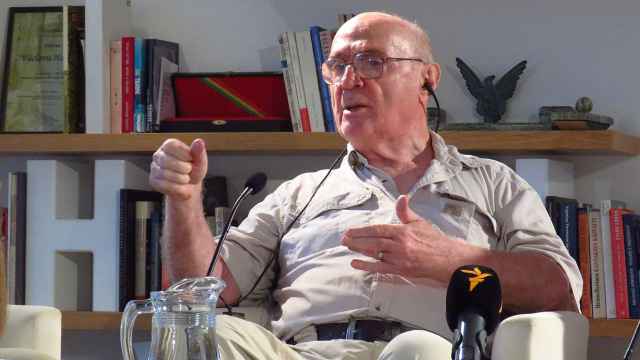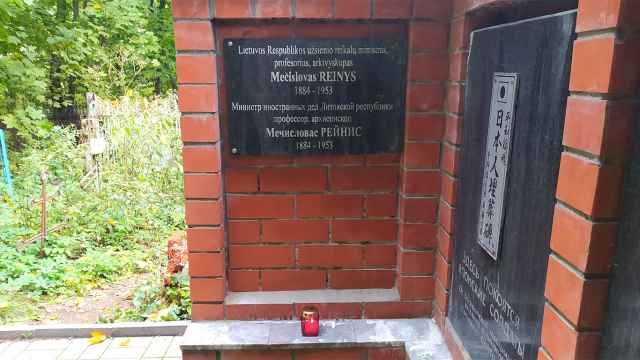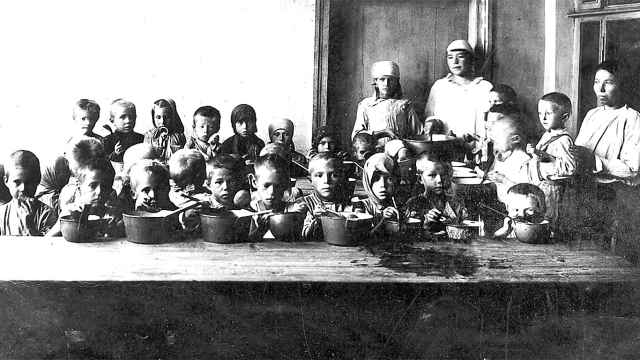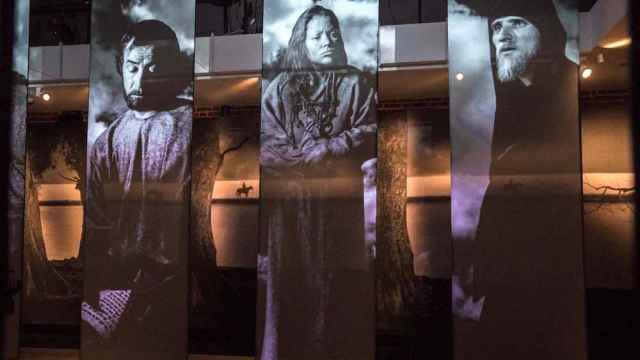In 1991, the Iron Curtain ruptured, the Soviet Union collapsed and restrictions on emigration disappeared. Suddenly, Soviet Jews spilled out of the vanishing empire, departing for Israel, the United States and other countries around the world.
These were secular people, usually Russian-speaking and educated, often far from the folkways of their ancestors. To many who met them in emigration, they seemed quintessentially Russian and not particularly Jewish. In Israel, a joke even emerged to describe this dissonance: “Jews in Russia, Russians in Israel.”
Now, a new Russian documentary film is attempting to explain the development of this community. Written and produced by acclaimed journalist Leonid Parfyonov, “Russian Jews: 1918- 1948” is the second installment in a trilogy that seeks to shed light on Jews’ assimilation into Soviet society and their role in Russian history.
Parfyonov has dedicated his life to making films about Russian history and culture. Now, he is taking on an especially sensitive subject—the complicated relationship between Jews and Russian society.
But while Parfyonov frames the Russian Jewish story as “a rich, diverse part of Russian culture,” his film—which premiered on March 23 at Moscow’s Pioner cinema—has proven more than a bit controversial.
Jewish or Soviet?
In one of the early scenes of the “Russian Jews: 1918—1948,” socialist revolutionary Leon Trotsky—depicted as an animated version of a historical photo—rejects a 1922 offer from Vladimir Lenin to head the early Soviet government.
“Should we really give the enemy the additional weaponry of my Jewishness?” Trotsky asks.
“We have a great international revolution,” Lenin replies “What significance can such trifles have?”
That exchange encapsulates one of the central ideas of Parfyonov’s film: Jews’ transformation from an oppressed “other” in the Russian Empire to important builders of the Soviet state and society.
After years of discrimination under the tsar, Jews emerged as some of the strongest supporters of the Russian Revolution. With higher levels of literacy than the wider population, they became a critical human resource for the Bolsheviks and took up key roles in the burgeoning socialist government. In this way, Parfyonov argues, Jews ceased to be Jewish, becoming Bolsheviks and, later, Soviet people. This process effectively made them Russian.
Trotsky’s own story provides evidence for this. Born Leon Bronshteyn in today’s Ukraine, he changed his surname to the more Russian-sounding “Trotsky.” Later, he declared, “I am not a Jew; I am an internationalist.”
He was hardly alone in making that transformation. At the beginning of his music career, Lazar Vaysbeyn took on the pseudonym Leonid Utyosov for his performances. Under this stage name, he became an enormous star of music, film and the stage. For 50 years, Utyosov was the face of Soviet jazz.
“Utyosov lived 70 of his 87 years under this surname, and never regretted that he ceased to be Vaysbeyn,” Parfyonov says. “He chose this fate: to be a Russian performer.”
That view matches the account given in Utyosov’s autobiography, published in 1976. But understanding the true motivations and feelings of individuals like him is complicated — particularly in a society with a history of anti-Semitism.
Jews who supported the revolution were frequently internationalists. Having experienced discrimination, they viewed the revolution as a means to achieve their rights. These attitudes and experiences led some to take on new names, says Ilya Altman, a historian and co-chair of the Russian Holocaust Center.
“Each of these people had their own story and their own reasons,” he says. “It depended on each person’s perception of his national identity.”
Still a sensitive subject
A century after the Revolution, the Russian Jewish community has shrunk to a fraction of its former size. Official anti-Semitism—which appeared after World War II and defined the lives of Soviet Jews—is no longer a reality, and other ethnic groups have become the main object of discrimination in Russia. But the Russian-Jewish relationship remains fraught.
In light of this, few doubt the prodigious effort that Parfyonov has put into making the documentary trilogy, and most critics admit the films are well made and engaging. But the second installment of the series has raised concerns with some viewers.
After the release of “Russian Jews: 1918-1948,” film critic Anton Dolin noted that “in a strange way, a true anti-Semite could easily find confirmation for many of his paranoid theories” in the film.
His concern is not unfounded. In January, as activists in St. Petersburg demonstrated against a government plan to transfer St. Isaac’s Cathedral, a city monument, to the Russian Orthodox Church, deputy Duma Speaker Pyotr Tolstoy returned to the anti-Semitic conspiracy theories of old. Opponents of the transfer, he said, were descendants of “those who pulled down our churches in 1917” and “were continuing their ancestors’ work.”
Others have expressed concern that “Russian Jews” hardly deals with the Holocaust, in which between 2 and 2.5 million Soviet Jews lost their lives.
The Soviet Union tended not to “recognize Jews killed [by the Nazis] as a category of victims separate from other murdered civilians,” says Altman. “And that tendency often continues to this day.” For this reason, he considers telling the story of the Holocaust to be of critical importance.
Perhaps the clearest demonstration of the Russian-Jewish relationship’s complicated nature came during a discussion held after the film’s premier. There, an audience member said it bothered her that Parfyonov revealed the clearly Jewish birth names of well-known Soviet officials and cultural figures. After all, that is something anti-Semites also do to slander Jews, she explained.
This comment seemed to catch Parfyonov off guard. “I don’t consider [Russian Jewish history] a painful subject,” he later told The Moscow Times. He stressed that, in most cases, the influence and importance of the figures profiled in his film are undeniable.
But historian Oleg Budnitsky, a professor at Moscow’s Higher School of Economics, challenges that view. In modern Russia, Jewish history is no longer a taboo subject, but the so-called “nationality question”—the role and position of ethnic identities in society—remains uncomfortable for many people, he says. This is especially true for the Russian-Jewish relationship, with its complicated legacy of discrimination and conflict.
“It’s a delicate issue that must be discussed cautiously,” he told The Moscow Times.
For this reason, he is of two minds on Parfyonov’s film. As a historian, he has misgivings about Parfyonov’s approach and focus on prominent figures, but he sees the film’s broader value.
“If you want to know the history of Russian Jews, this isn’t the place,” he says. “But for many Russians, what [the film] says will be a real discovery.”
A Message from The Moscow Times:
Dear readers,
We are facing unprecedented challenges. Russia's Prosecutor General's Office has designated The Moscow Times as an "undesirable" organization, criminalizing our work and putting our staff at risk of prosecution. This follows our earlier unjust labeling as a "foreign agent."
These actions are direct attempts to silence independent journalism in Russia. The authorities claim our work "discredits the decisions of the Russian leadership." We see things differently: we strive to provide accurate, unbiased reporting on Russia.
We, the journalists of The Moscow Times, refuse to be silenced. But to continue our work, we need your help.
Your support, no matter how small, makes a world of difference. If you can, please support us monthly starting from just $2. It's quick to set up, and every contribution makes a significant impact.
By supporting The Moscow Times, you're defending open, independent journalism in the face of repression. Thank you for standing with us.
Remind me later.


